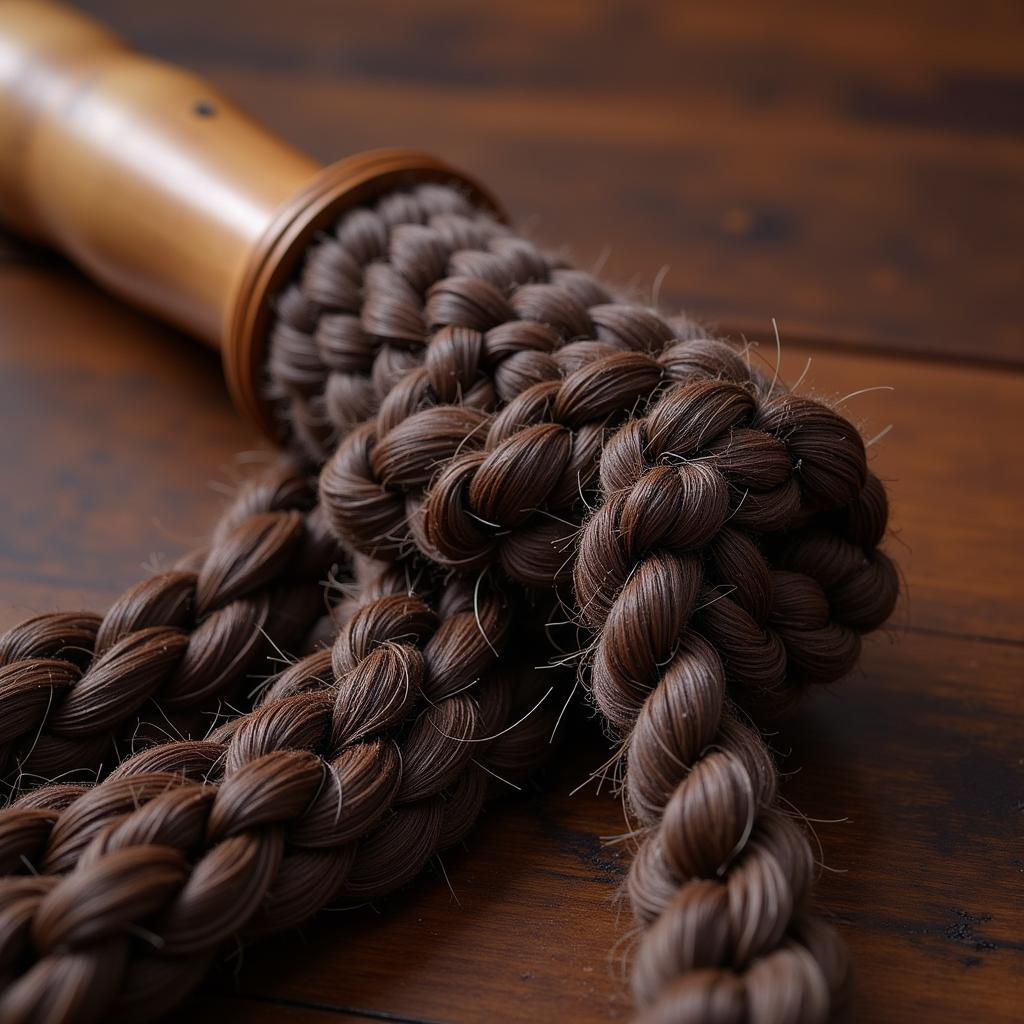Horse Hair Floggers are a type of riding whip traditionally made using horse hair. While they might seem like simple tools, they represent a long history of equestrian tradition and horsemanship. Whether you’re a seasoned rider or new to the equestrian world, understanding the purpose and use of horse hair floggers is crucial for ethical and effective riding.
 Close-up of a Horse Hair Flogger
Close-up of a Horse Hair Flogger
The History and Craftsmanship of Horse Hair Floggers
Horse hair floggers have been used for centuries, evolving alongside riding disciplines. Early versions were likely simpler, focusing on functionality. Over time, they became more refined, with intricate braiding techniques and high-quality materials reflecting a dedication to craftsmanship.
The Purpose and Use of Horse Hair Floggers
It’s crucial to understand that horse hair floggers are not meant for punishment. Their primary function is as an aid to communicate with your horse and refine their responses to your cues. The light, swishing sound and feel of a flogger can encourage forward movement or help refine lateral work.
Different Types of Horse Hair Floggers
Just as riding disciplines vary, so do the types of horse hair floggers. Dressage whips, for example, are longer and thinner, designed for precise cues. Jumping whips, on the other hand, are shorter and sturdier, offering encouragement over fences.
Choosing the Right Horse Hair Flogger
Selecting the appropriate flogger depends on your riding style and your horse’s sensitivity. Factors like length, weight, and material all play a role. It’s always advisable to seek guidance from an experienced trainer or instructor to determine the best option for your needs.
Caring for Your Horse Hair Flogger
Like any piece of equestrian equipment, proper care ensures your flogger remains in top condition. Regular cleaning and proper storage prevent damage and prolong its lifespan.
Ethical Considerations and Responsible Use
Using a horse hair flogger ethically and responsibly is paramount. It should never be used out of anger or frustration. Remember, these tools are aids for communication, not punishment. Overuse or misuse can create fear and anxiety in your horse, damaging the trust and bond you’ve built.
Conclusion
Horse hair floggers, steeped in tradition and equestrian heritage, are tools designed to enhance communication between horse and rider. Choosing the right flogger and understanding its proper use are essential aspects of responsible horsemanship, promoting a harmonious and respectful partnership with your equine companion.
FAQs about Horse Hair Floggers
-
Are horse hair floggers cruel?
When used correctly, horse hair floggers are not cruel. They are designed to be a gentle aid for communication, not punishment. -
What is the difference between a horse hair flogger and a riding crop?
While both are riding aids, floggers are generally longer and made from horsehair, producing a lighter, quieter sound. Crops are often shorter and made from leather or synthetic materials, resulting in a sharper sound. -
How do I know what size flogger to get?
The ideal flogger size depends on your discipline and horse. Consulting with a riding instructor can help determine the most appropriate length and weight. -
Can I use a horse hair flogger on any horse?
Some horses are more sensitive than others. It’s important to assess your horse’s temperament and always introduce a flogger gradually and positively. -
Where can I buy a quality horse hair flogger?
Reputable tack shops and online retailers specializing in equestrian equipment often carry a selection of horse hair floggers.
Need more assistance with your equestrian needs? Contact Justus Horses USA at 0772127271, email us at [email protected], or visit our location at QGM2+WX2, Vị Trung, Vị Thuỷ, Hậu Giang, Việt Nam. Our dedicated team is available 24/7 to answer your questions and provide expert guidance.